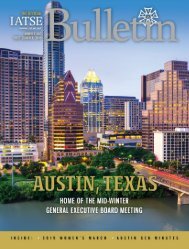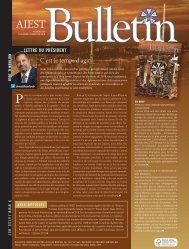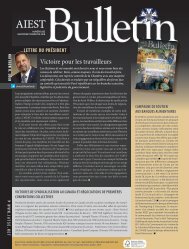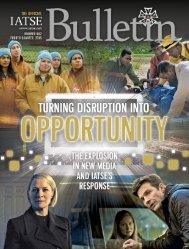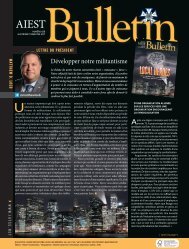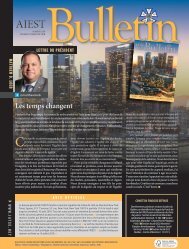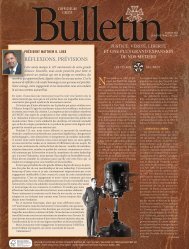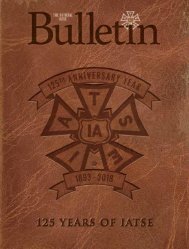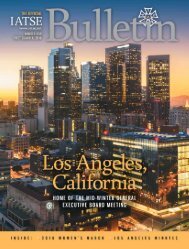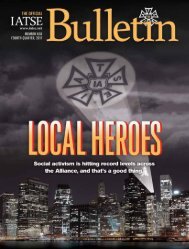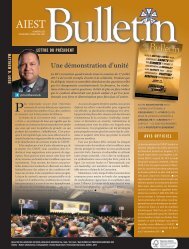IATSE_3rd2017_web
You also want an ePaper? Increase the reach of your titles
YUMPU automatically turns print PDFs into web optimized ePapers that Google loves.
provide safety and skills training to IA<br />
members. For the first time in the Basic<br />
Agreement, companies meeting certain<br />
criteria will put payroll deposits in place<br />
to guarantee <strong>IATSE</strong> wages and benefits.<br />
In summary, the IA made historic<br />
advancements in these Basic Agreement<br />
negotiations. Employer-paid benefit contributions<br />
are estimated at $100 million<br />
during the term of the contract (plus<br />
more than $43 million every year thereafter).<br />
Meanwhile, IA members incurred<br />
no cuts in health benefits (for example,<br />
no increased costs for dependents, and no<br />
increases in the number of hours needed<br />
to qualify for eligibility). This exceptional<br />
outcome can be attributed to many elements.<br />
Above all, however, the strength,<br />
solidarity and leadership of the <strong>IATSE</strong><br />
(including its bargaining committee, local<br />
unions, and members) were key factors in<br />
our collective success.<br />
Shortly after the conclusion of Basic<br />
Agreement bargaining, the Area Standards<br />
Agreement (ASA) was renegotiated.<br />
Leaders of the affected IA Locals<br />
served on the <strong>IATSE</strong>’s committee along<br />
with International officers and staff. Bargaining<br />
commenced at the offices of the<br />
Alliance of Motion Picture and Television<br />
Producers (AMPTP) in late April of 2015.<br />
Goals for these negotiations included<br />
raising yearly wage increases; increasing<br />
employer-paid health contributions; establishing<br />
employer-paid contributions<br />
to the <strong>IATSE</strong> Training Trust Fund; securing<br />
jurisdiction over certain locations department<br />
employees; and clarifying that<br />
set teachers work in <strong>IATSE</strong> covered classifications.<br />
Negotiations lasted four days and<br />
the Alliance secured its major priorities.<br />
The new ASA includes yearly 3 percent<br />
wage increases. Daily benefit contributions<br />
increase by five dollars per person in<br />
each year of the contract. Employers now<br />
contribute for the first time to the Training<br />
Trust Fund for each hour worked by<br />
every <strong>IATSE</strong> employee. These significant<br />
contributions will provide safety and<br />
skills training for the members who work<br />
within ASA jurisdictions long into the<br />
future. As with the Basic Agreement, the<br />
ASA’s new media terms now deliver superior<br />
conditions for members working<br />
on high-budget SVOD productions. This<br />
was an important gain for IA members<br />
engaged on these projects around the U.S.<br />
Below the high budget tiers there<br />
were other improvements. IA members<br />
working on new media productions with<br />
a budget of less than $25,000 per minute<br />
will receive five dollar per day increases in<br />
benefit contributions in each year of the<br />
Agreement. In addition to these robust<br />
economic gains, locations department<br />
jurisdictions were defined and set teachers<br />
are now in a verified contractual classification.<br />
These clarifications will secure<br />
the financial outlook for many <strong>IATSE</strong><br />
members.<br />
Safety concerns were also addressed<br />
in the renewed ASA. Extended workday<br />
safety guidelines were incorporated into<br />
the body of the Agreement. Employers<br />
may now provide courtesy housing or a<br />
ride home when crew members are too<br />
tired to travel. These stipulations coincide<br />
with the requirement that employees<br />
receive 10 hours of rest after consecutive<br />
workdays of 14 hours or more. All<br />
call sheets must also list the studio safety<br />
officer and studio safety hotline.<br />
These features provide long-term<br />
stability for <strong>IATSE</strong> members within<br />
the motion picture industry across the<br />
country. The ASA bargaining committee<br />
unanimously endorsed the contact and<br />
it was ratified by the General Executive<br />
Board.<br />
The <strong>IATSE</strong>’s Low Budget Theatrical<br />
Agreement (LBA) was negotiated<br />
twice in the last four years. This contract<br />
imparts beneficial working conditions to<br />
a segment of the industry which—in the<br />
not distant past—was principally completed<br />
with non-union labor. It covers<br />
hundreds of companies throughout<br />
North America producing features with<br />
budgets of $14.2 million or less.<br />
In November 2013, <strong>IATSE</strong> officers<br />
and representatives of Locals from across<br />
the U.S. and Canada met in Los Angeles<br />
to negotiate a successor contract. After<br />
these negotiations, the LBA became the<br />
first national contract with weekend<br />
turnaround. In addition, it now includes<br />
portal-to-portal language for daily turnaround,<br />
and pay increases for specialized<br />
work. Meal penalties and per diem<br />
payments were increased and wages will<br />
increase in accordance with the terms of<br />
other major agreements. The LBA now<br />
contains language preserving <strong>IATSE</strong> work<br />
(thus curbing subcontracting), which is<br />
stronger than any national <strong>IATSE</strong> production<br />
contract. With this advancement,<br />
we hope to stem the use of mobile labs<br />
and other non-union entities.<br />
In September of 2016, the parties<br />
again agreed to industry standard wage<br />
and benefit increases, thereby ensuring<br />
three more years of stability for IA<br />
members working on low budget features<br />
in the U.S. and Canada. The LBA<br />
recognizes the economic challenges of<br />
THIRD QUARTER 2017 57





